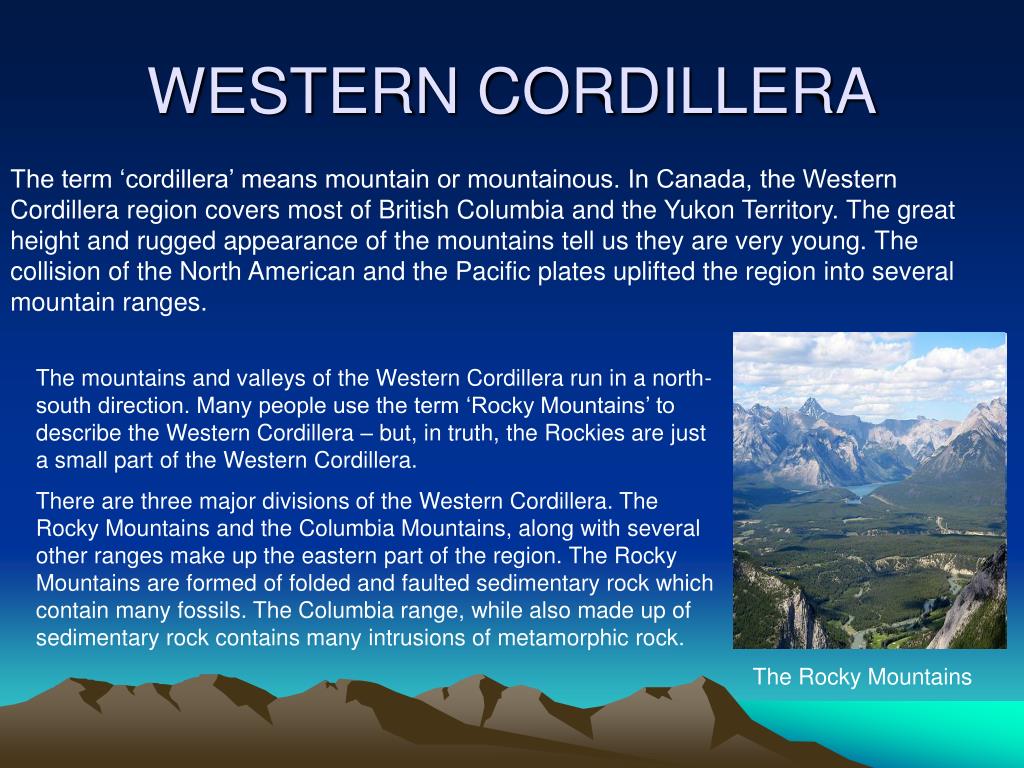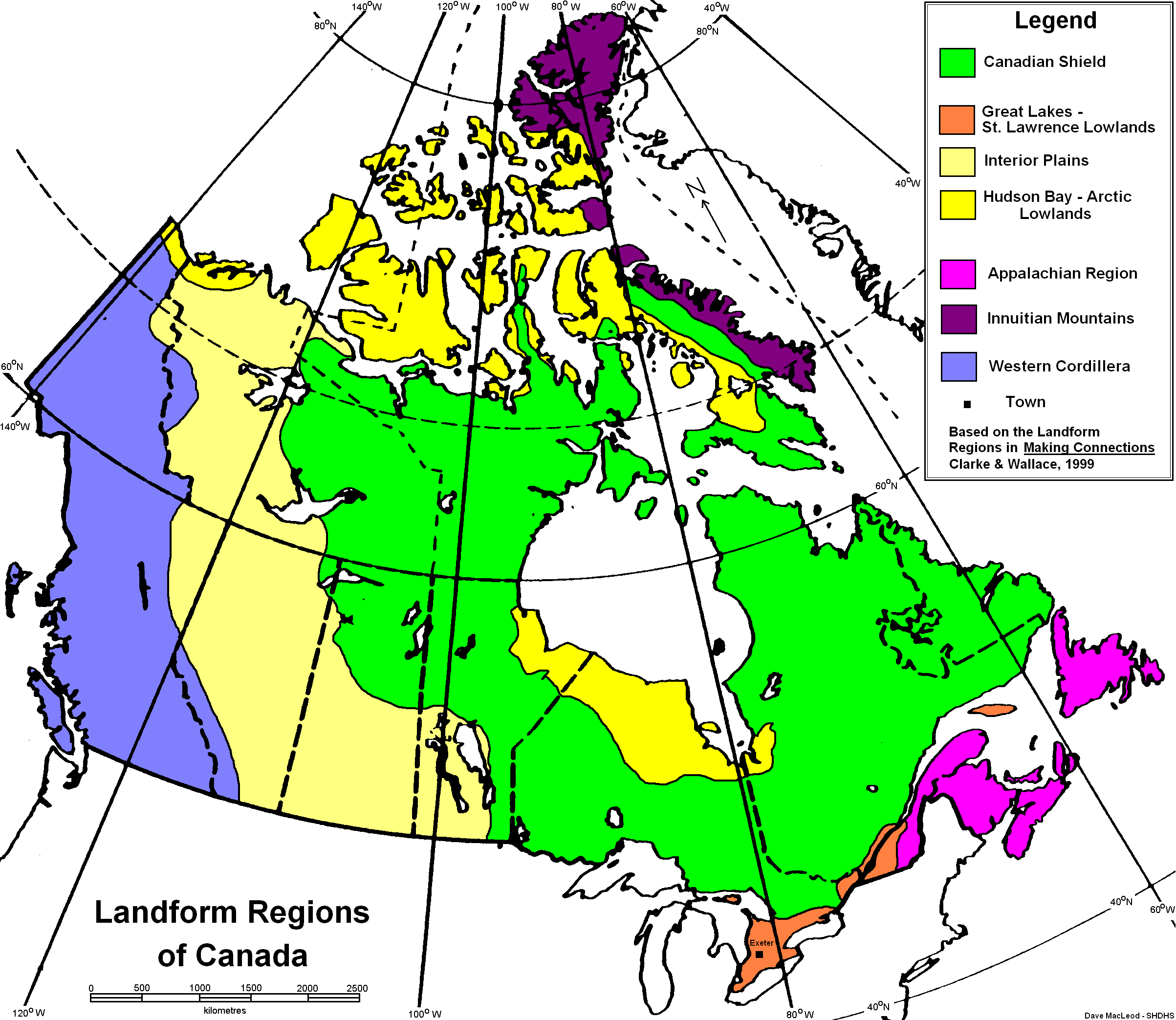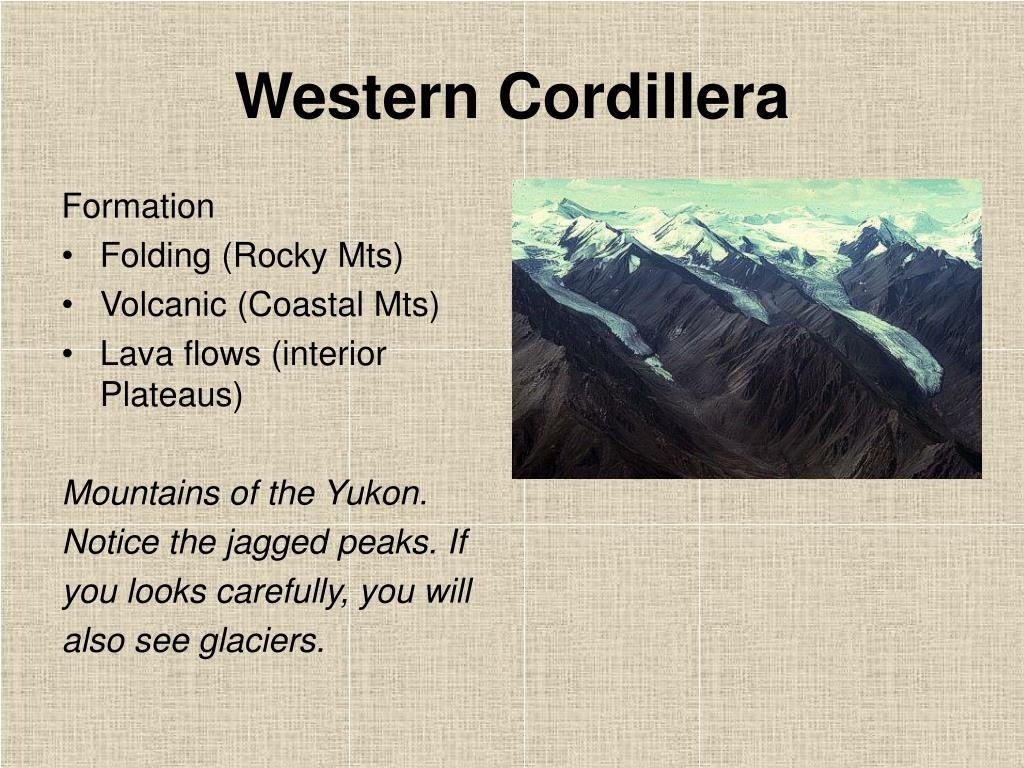
Western Cordillera by Claire T Issuu
Climate The Western Cordillera has a maritime climate. The weather is very wet during the fall and winter. Parts of this region being the wettest areas on Earth. Summers are cool by comparison to the rest of the country, and Winters being short, makes the growing season last from only April to mid October.

What Is The Western Cordillera Known For Best Tourist Places in the World
Most of the Western Cordillera was built between about 170 million and 40 million years ago when lithospheric plates converged with North America at rapid rates of many tens to more than 100 millimetres (4 inches) per year. The Juan de Fuca Plate is the last remnant of one of these plates.

PPT Land Form Regions of Canada PowerPoint Presentation, free
(more) The Middle Rockies cover most of west-central Wyoming. Most of the ranges resemble the granitic upwarps of Colorado, but thrust faulting and volcanism have produced varied and spectacular country to the west, some of which is included in Grand Teton and Yellowstone national parks.

PPT LANDFORM REGIONS IN CANADA PowerPoint Presentation ID309849
Early History The North American continent, of which Canada represents the northern half, was assembled from continental fragments by the process of plate tectonics. Scientists think that this process started more than 3 billion years ago, when the production of continental crust first began.

Simplified geologic map of the western Cordillera with the location of
Physiographic Regions Canada has seven physiographic regions. These regions are the Canadian Shield, the Western Cordillera, the Canadian Arctic, the Appalachian Region, the Interior Plains, the Hudson Bay Lowlands and the St. Lawrence Lowlands. (map by The Canadian Encyclopedia) Canadian Shield

Western Cordillera WEST2East
physiography of North America In North America: The Cordilleras Taking up about one-third of North America, the Cordilleras completely dominate Alaska and Central America and swell out widely in the United States as the Rocky Mountains. Read More stratigraphy of Cambrian Period In Cambrian Period: Types and distribution

Western Cordillera Landform Region Western Cordillera What is it?
On the North American continent, the westernmost physiographic region that extends from Mexico to Alaska is commonly called the Western Cordillera, Cordilleran region, or simply Cordillera. The Canadian portion of this system includes the Rocky Mountains and the Coast Mountains .

Simplified geologic map of the western Cordillera with the location of
The Western Cordillera was formed roughly 80 million years ago by the North American plate and the Pacific Plate colliding, The western Cordillera is attached to the pacific ocean because of the collision. In the rocky Mountains there are also many types of rock such as Gold, Silver, Zinc, Led, and fossil fuels such as coal, gas, and oils.

Simplified geologic map of the western Cordillera with the location of
How Was The Western Cordillera Formed? The Western Cordillera was formed when the North American Plate collided with the much heavier Pacific Plate. The Pacific Plate was more dense so it was forced down and the North American Plate was lifted upward. The heavier pacific plate managed to fold underneath the smaller North American plate.

PPT Canada’s Landform Regions PowerPoint Presentation, free download
Cordillera. A cordillera is an extensive chain and/or network system of mountain ranges, such as those in the west coast of the Americas. The term is borrowed from Spanish, where the word comes from cordilla, a diminutive of cuerda ('rope'). The term is most commonly used in physical geography [1] and is particularly applied to the various.

Tectonic map of the North American Cordillera, including the North
There are a lot of fun facts about the Western Cordillera. A system of mountain ranges that frequently consists of a series of more or less parallel chains (from old Spanish cordilla, "cord," or "small rope"). Cordilleras are found in the Americas and Eurasia. In this article, we will share many more fun facts about the Western Cordillera.

What Is Western Cordillera Known For
Western Cordillera - had been a passive (rifted) margin since the Proterozoic - by Devonian it became an active (subduction) margin (Devonian Antler Orogeny in Nevada) - small orogenies (Sonomian and Nevadan) occurred during the Triassic through Cretaceous as the result of the accretion of exotic terranes

Geologic sketch map of a part of the western North American Cordillera
The North American Cordillera, sometimes also called the Western Cordillera of North America, the Western Cordillera or the Pacific Cordillera, [1] [2] is the North American portion of the American Cordillera, the mountain chain system ( cordillera) along the western coast ( Pacific coast) of the Americas.

PPT Canada’s Landforms PowerPoint Presentation, free download ID
The Western Cordillera is located on the west coast of Canada, and is present in the Yukon Territories, British Columbia, and western Alberta. This landform region of Canada was formed roughly 80 million years ago in the Mesozoic Era by the encounter of the North American Plate and the heavier Pacific plate.

Geological map of the Western Cordillera from 1° North to 1° South
The American Cordillera is a chain of mountain ranges ( cordilleras) that consists of an almost continuous sequence of mountain ranges that form the western "backbone" of the Americas. [2] Aconcagua is the highest peak of the chain. It is also the backbone of the volcanic arc that forms the eastern half of the Pacific Ring of Fire .

Structures and deformed units of the Western Cordillera. A. A view
Major oxide and trace element, including REE data from the Western Cordillera, Cauca - Patía Valley and the Central Cordillera of Colombia. Samples DV38 DV39 DV40 DV74 DV75 DV102 DV103 DV104.